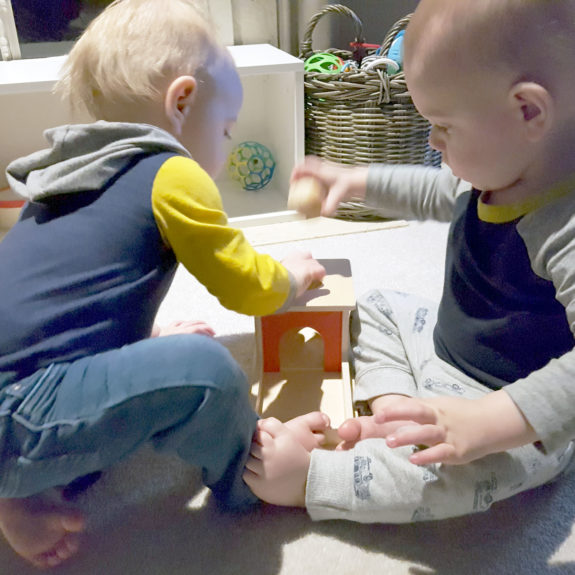My children weren’t yet born when I first discovered Montessori parenting books. I was quickly drawn to Maria Montessori’s approach: child-centered learning, gentle parenting, and thoughtfully prepared environments filled with natural materials accessible to the child. I felt genuinely excited about the positive impact this philosophy could have on my future children’s lives. But not everyone shared that excitement. Some were skeptical. Whether it was well-meaning loved ones questioning our Montessori choices or strangers offering unsolicited advice, the pushback often made us second-guess our approach.
Maybe you can relate—feeling torn between exploring Montessori parenting principles and keeping the peace with the people closest to you. In this post, we’ll look at how to model your values with quiet confidence and stay grounded, even when your support system doesn’t fully align.
1. Modeling Montessori Parenting
Just as we model conversations and social interactions for our little ones, we can apply this by modeling how we want our children treated by others. Let others see in real time how you interact with your child.
You don’t need to broadcast your intentions model Montessori parenting or make a show of your child’s actions. Simply allow your child to go about their day as they would at home. Small moments where we sit on our hands, close our mouths and watch can have the greatest impact. The goal is for other people to take their cue from you- if you don’t feel the need to intervene, neither should they. These intentionally casual moments showcase what our children are capable of far more than words. They show others that your child is capable of resolving minor conflicts with as little adult intervention as possible.
This can also be incredibly uncomfortable for adults used to jumping in to “help” or prevent mistakes. We model for others the trust and respect we have in our children to figure things out for themselves. . Modeling can break down misconceptions, and challenge prejudgments that others may not even be aware they carry.
2. Have Open Conversations About Montessori Parenting
Modeling respectful parenting plants the seed, laying the groundwork for honest conversations. From the start, understand that one conversation may not be enough. Your goal is not to overload with information or overcome every possible objection. This is a two way dialogue, not a lecture.
Build your conversations around real moments they can observe. For example:
“NAME knows that we throw napkins away after snack time. Can you show him where the trash can is? He likes to throw it out himself, so I don’t need to tell him to or say good job.”
This may open up further questions of interest, or it may not. This may open up further questions of interest, or it may not. Some people might feel defensive, especially if they interpret your parenting style as a perceived critique of theirs.
In some circles, the word “Montessori” can be polarizing. Rather than trying to demystify the idea of Montessori parenting for someone with negative preconceptions, drop the word and focus on the principles. For example, share why you offer glass cups instead of sippy cups, or why you allow children to use real forks and knives.
3. Know Your Core Parenting Values
Before asking others to support your approach, take time to reflect on what truly matters to you.
Ask yourself:
- What are my non-negotiables as a parent?
- Why do these values matter to me?
- Where am I willing to compromise?
- When am I not?
Reflecting back on whether something violates your core values helps you respond more confidently, even if it ruffles some feathers. For example, you may feel strongly that children should be encouraged, but not forced to share their toys with others in order to preserve their autonomy. It can also provide clarity so you don’t feel guilty when you need to compromise on the less important issues, such as allowing a sweet treat at Nana’s house that aren’t permitted at home. These examples may be reversed, depending on where your values rest. Every family is unique.
We tend to see everything as equally important, and deviations from this ideal standard can feel like offering our children less than they deserve to thrive. This is simply not realistic or sustainable.
4. Don’t Let Rigidity Weigh You Down
There will never be a perfect formula to convince every person, in every scenario, to interact with your children in a way that aligns with your Montessori parenting style. This can be really challenging to accept and may lead to unhealthy responses. We might turn that guilt inward, feeling like we didn’t try hard enough to make the right choices at the right time. Or, we might direct blame outward, placing unfair criticism on others for not caring enough to nurture our child’s full potential.
Just as we hold space to trust and respect our children’s unique learning journey, we must also have that same grace and respect for loved ones who hold a regular presence in our children’s lives. Instead of fighting for perfect consistency, focus on nurturing the time important people in your life are investing in your child. Maximize the good they bring, rather than fixating on perceived faults.
If someone has no interest in fostering shelf work, baby-led weaning, or even disagrees with the very ideas, drop the topic completely. Take comfort that you already have that well in hand. You do not need the approval of others to validate your parenting approach.
If later on they ask questions, or seem interested, great. If not, that’s okay too.
Let others connect with your child in their own way. Bring it back to your core values (as discussed in #3). As long as you all are united on the big picture, the fine details are far less important. Even if your child is repeatedly gifted loud, flashy battery operated toys, or your child is constantly told “good job” from other well-meaning parents, these moments won’t undo your foundation.
And if your child is confused by these differences, help them make sense of it. Children are constantly navigating a wide range of environments—schools, daycare, friends’ homes, family gatherings, community centers—all of which come with different people, expectations and rules. Welcome the chance to hear out any inconsistencies they may have noticed. These differences may be exciting to a child, or concerning. Healthy self-regulation and adaptation is a key goal of a well-rounded Montessori upbringing.
5. Staying Motivated When Montessori Isn’t a Shared Vision
Parenting in general can be an isolating experience. Even more so when those in your support circle are not supportive of your Montessori journey.
Looking beyond your immediate circle for like-minded families can be a powerful source of encouragement and inspiration.
Here are a few ways to find your Montessori community and stay motivated:
- Join in-person Montessori meet-ups: Local groups often meet at parks, community centers, or each other’s homes. These gatherings are great for both your child and your own sense of connection.
- Visit Montessori school open houses: You don’t always need to be enrolled to attend these events. Just check out the scene, tour classrooms, and chat with fellow Montessori families.
- Host Playdates with like-minded families: Reach out to parents who share similar values. You can offer to host at your home, or just schedule a meet up of your own at a local play center.
- Engage in online communities. Join Facebook groups, Reddit threads, or Zoom hangouts where you can ask questions or just vent.
- Follow Montessori blogs and creators. (like this one!): You may be surprised just how relatable a stranger’s journey is to your own. Source out real stories and guidance from parents who have been where you are now.
- Tune into podcasts or YouTube: When your day is absolutely packed just trying to meet your little one’s basic needs, plugging into a podcast on your commute or stroller walk can be a great rejuvenating form of therapy. I binged a lot of Jesse McCarthy walking with my twins.
The adult ought never to mould the child after himself, but should leave him alone and work always from the deepest comprehension of the child himself.








